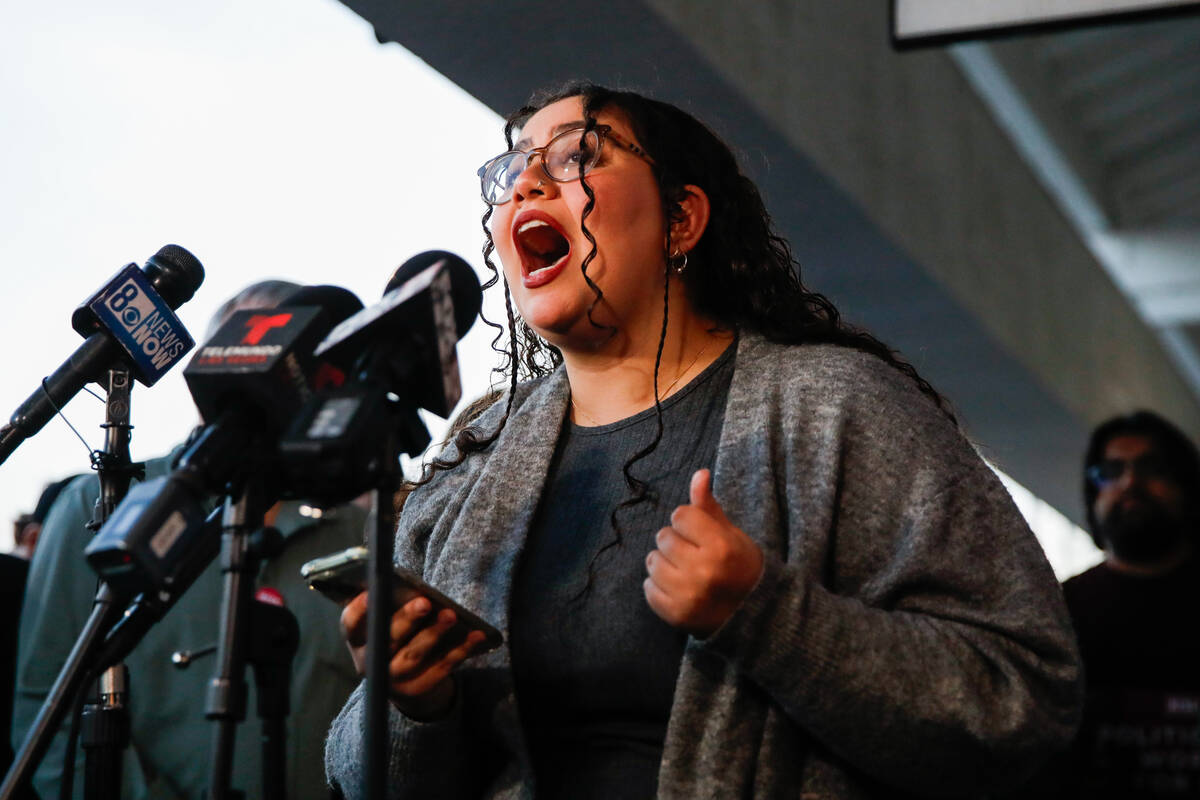‘Enough is enough’: Students, activists urge leaders to take action after UNLV shooting

Enough is enough, said a group of UNLV students and activists at a news conference Thursday, while calling for a multipronged approach to ending the kind of gun violence that left three professors dead and a fourth wounded in last week’s mass shooting.
Some of the students at the news conference outside a coffee shop on South Maryland Parkway, north of the UNLV campus, also spoke about their experience of being holed up in a meeting room in the student union as the shooting and the police response played out.
Professors Naoko Takemaru, Patricia Navarro Velez and Cha-Jan “Jerry” Chang were killed in the shooting. An unidentified male visiting professor was wounded.
The gunman, identified as Anthony Polito, 67, was shot and killed by university police.
UNLV political science student Zena Hajji, 21, was in Room 208 in the student union for a training session on organizing and issue advocacy, put on by the activist group Rise Nevada, which advocates for the restoration of funding to public higher education to make public colleges and universities free, and helps students organize and lead advocacy campaigns.
“Halfway through, it was disrupted by a mass shooting, by the individual that has now been proclaimed dead by the police,” said Rise Nevada’s state director Chris Solomon, speaking outside TIABI Coffee and Waffle on Thursday.
After text alerts about an active shooter on campus started going out, the group of over 80 people, which included students, were inside Room 208.
When they were finally brought out to safety by police, Hajji said, they had to walk past a body. It was Polito, but the students didn’t know that at the time.
“A lot of the kids were told to turn right, turn right. I turned right but a lot of my friends didn’t, and they saw it, and that’s forever going to be ingrained in their minds,” Hajji said.
“I couldn’t look at it. I didn’t want to. I already knew what they were saying turn right for,” Hajji said. “We didn’t know if it was the body of the shooter, we didn’t know if it was the body of a professor, a student, or like, a bystander. We didn’t know.”
Hajji said all of the drills she did in high school came back to her, including the enacting of safety measures like barricading the doors, turning off lights and moving students to different areas of the room, among other things. People were hiding underneath desks, hiding near walls and staying away from the emergency exits.
“No one should have to have that knowledge,” Hajji said.
Millan Gledhill, a political science and film student at UNLV who was also in the Rise Nevada training session, said he didn’t want to say much about his experience in that room in the student union.
“Because it’s a little too early and a little too soon,” Gledhill said. “All I will say is that I will be forever haunted by the decision that I had to make of whether to tell my parents goodbye. And I will forever be haunted by the image of blood on concrete.”
“It’s regrettable, it’s awful and I’m glad that he’s gone,” Amanda Hanson, 36, a hospitality student said of the shooting, and the shooter.
Solomon said members of Gen Z like him and other UNLV students are tired of what they said is America’s culture of violence. But the issue of guns alone isn’t the problem, Solomon said. Mental health is also a factor, among other issues that make up the root causes of gun violence, he said.
“Our message is enough is enough,” Solomon said, adding that “we’re tired of being paid lip service. The thoughts and prayers cycle is never-ending.”
Rise Nevada noted in a news release that the Dec. 6 UNLV shooting was the 633rd mass shooting in the United States this year.
There have been more since then. According to the Washington, D.C.-based nonprofit Gun Violence Archive, there have been 636 mass shootings this year. That total includes the discovery Monday of four deaths tied to a murder-suicide in northwest Las Vegas.
Hajji says she doesn’t feel safe at school.
“I still live on campus and I don’t feel safe half the time. I don’t feel good being alone, because I was in a room full of people when it happened. Now, I don’t feel safe on campus.”
Contact Brett Clarkson at bclarkson@reviewjournal.com.